"Johnny & Jones": The Nazis deported jazz duo to concentration camps
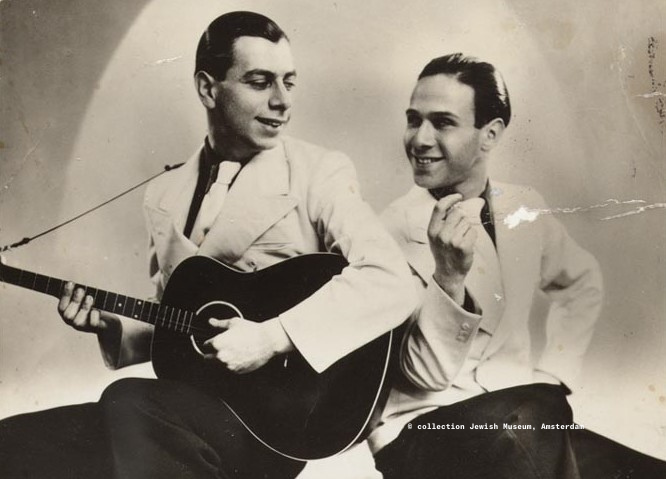
As young men, the friends and great cousins Max Kannewasser and Arnold van Wesel formed the jazz duo “Johnny & Jones.” Arnold as “Johnny” and Max as “Jones” delighted the audience in the Netherlands, their country of origin. When the German Wehrmacht had occupied the Netherlands in May 1940, “Johnny & Jones” were no longer allowed to perform and persecuted as political Jews.
Max Salomon Meijer Kannewasser was born in Amsterdam on September 24, 1916. His great cousin Arnold Siméon van Wesel, also known as Nol, was born just under two years later, on August 3, 1918, also in Amsterdam. As young men, the two were employed at the Amsterdam department store De Bijenkorf. Arnold worked in accounting and Max sold kitchen appliances.

The department store De Bijenkorf around 1939 (Source: Wikimedia Commons; Stadsarchief Amsterdam)
The beginning of a great music career
The department store was the place where Max and Arnold dared to take their first musical steps together. In 1934, they performed in a quartet called “Bijko Rhythm Stompers” at a company party of the department store. Two years later, they quit their jobs to devote themselves fully to music forming the jazz duo “Johnny & Jones.” Arnold aka Johnny played the guitar while Max aka Jones sang the English and Dutch lyrics. The courageous step they took towards making their lives’ dream come true was to pay off. “Johnny & Jones” did not take long to delight their audience. Theater stages were keen on engaging the coveted musicians – the two men in their early 20s became two of the first Dutch teen idols. They sang e.g. at high school dances and even in the halftime show of an international soccer match between Holland and Belgium in 1939. Their songs were a characteristic mixture of scat, jazz, and Dutch music and were played non-stop on the Dutch radio station VARA.
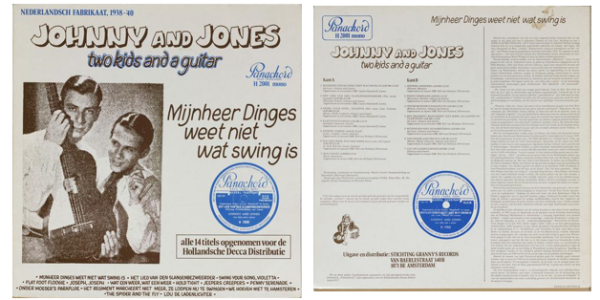
Re-release of the classic “Johnny & Jones” songs in 1980. Recorded in November 1938 and in the period January 1939 to March 1940. (Source: Inventory number 20001144 Collection Jewish Museum, Amsterdam)
When the German Wehrmacht occupied the Netherlands in the spring of 1940, though, the dream of a career in music came to an abrupt end. Considered Jewish according to the antisemitic legislation, “Johnny and Jones” were able to perform in front of Jewish audiences only from then on. In 1941, a complete stage ban was imposed on them.
(Video in German)
Max and Arnold played their music even in the concentration camp
Together with their wives Gerda (née) Lindenstaedt, who had fled from Germany to Holland in 1939, and Suzanne (née) Koster, they lived for a time in hiding in a Jewish nursing home, where they played their songs sometimes for both, employees and patients. When the Nazis raided the nursing home to search for hidden Jews, the two couples’ hiding place was discovered. On October 9, 1943, the Nazis imprisoned Arnold, Max, Gerda and Suzanne in the Westerbork transit camp. Here Max and Arnold had to do forced labor, disassembling shot down airplanes.
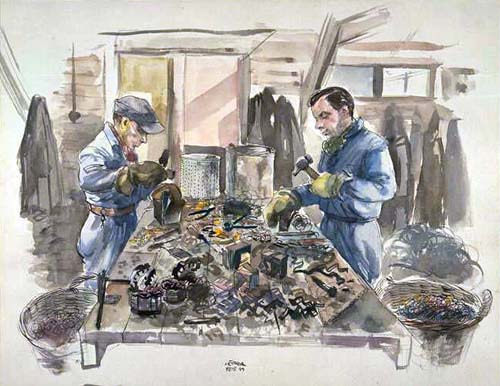
A picture of Max and Arnold as forced laborers in the Westerbork camp, painted by Leo Kok, February 1944. (Source: Collection Jewish Museum, Amsterdam)
Time and again, they were allowed to leave the camp under supervision to do their work elsewhere. During one of these forced labor assignments, they managed to record some songs in Amsterdam. Because “Johnny & Jones” continued to make music in the camp. The Nazis were ambivalent about jazz music: while considering jazz “degenerate art” on the one hand, they approved it whenever they saw an advantage in it on the other.
On the days when deportations of inmates to the concentration and extermination camps had taken place, Albert Konrad Gemmeker, the camp commander of Westerbork, used to organize cabaret events in the evening to divert the remaining prisoners with music. “Johnny & Jones” performed at these shows where they mostly had to sing in German. One of today’s most famous songs by “Johnny & Jones” was written in the camp: the “Westerbork Serenade”. Max and Arnold here use the cover of a love song to sing about life in the camp. One line of the song reads: “Langs het spoorwegbaantje schijnt het zilveren maantje”, which translates: “Along the railroad tracks shines the silvery moon”.
Max’s wife Suzanne was the only one of the four to survive the Holocaust
Max and Arnold were kept prisoner in Westerbork for about eleven months until the Nazis deported them first to the Theresienstadt ghetto in September 1944 and then to the Auschwitz-Birkenau concentration and extermination camp. In December 1944, the Nazis transported the two men on to Ohrdruf in Thuringia, where a subcamp of the Buchenwald concentration camp was located. From there they were finally transferred to the Bergen-Belsen concentration camp on March 13, 1945. Arnold died at the age of just 26 on April 15, 1945, the day the Bergen-Belsen concentration camp was liberated. Max did not survive concentration camp imprisonment either. He had already died in the camp in March 1945, aged 28. Arnold’s wife Gerda perished in Auschwitz. Only Max’s wife Suzanne survived persecution by the National Socialists.
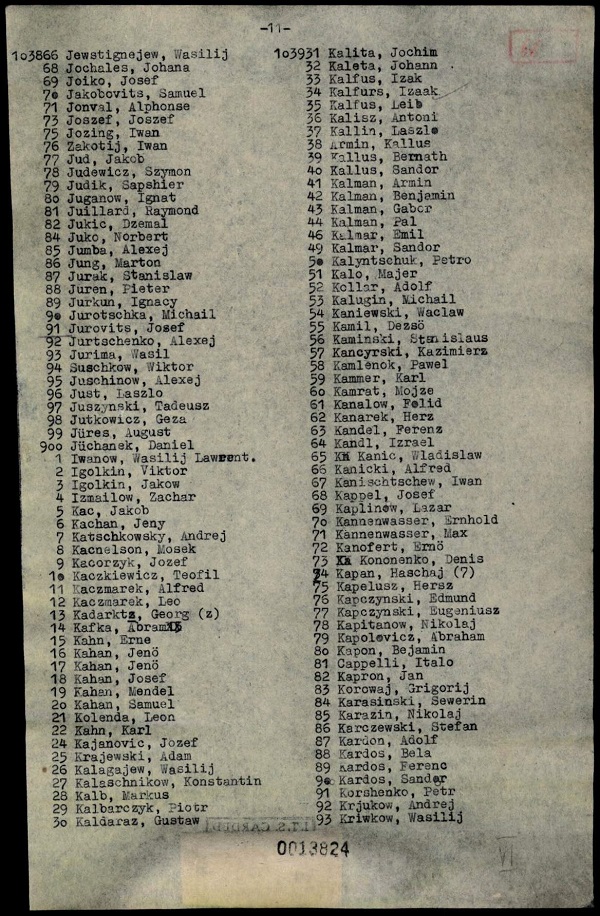
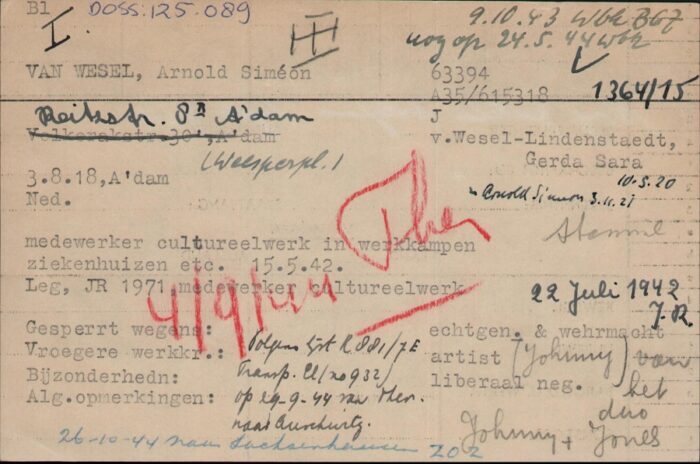
Documents in the Arolsen Archives
The Arolsen Archives preserve documents relating to Arnold Siméon van Wesel and Max Salomon Meijer Kannewasser. Some of them can be viewed in the online archive.
Sources:
Beek, Paul: Johnny & Jones. In: Music and the Holocaust. https://holocaustmusic.ort.org/places/camps/western-europe/westerbork/johnny-jones/
De Klein, Dirk: Johnny & Jones-Jazz musicians, killed because they were Jewish. In: History of Sorts. https://dirkdeklein.net/2018/04/26/johnny-jones-jazz-musicians-killed-because-they-were-jewish/ 26. April 2018.

